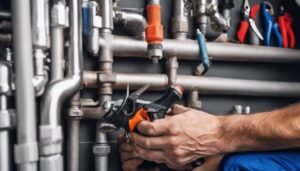In Burbank, California, a city of sunshine, creativity, and charming homes, homeowners need to mind their pipes, gutters, and sewers if they want a comfortable and livable house. Sure, the sun shines and the movie business is booming, but without sound plumbing systems, the whole scene could fall flat.
Everyone needs good plumbing systems, no matter where they live. Whether you’re a desert dweller or a resident of rainy Oregon, you need systems that can handle plumbing issues without backup. Let’s look at causes of nasty backups and squeaky pipes, and why you need to deal with small plumbing issues before they turn into huge ones with massive repair or replacement bills.
What Plumbing Really Does
Plumbing is one of those systems we tend to take for granted but is useful for so much more in our daily lives. At its most basic, it brings water in and carries it out. Toilets, sinks, bathtubs, washing machines, dishwashers, and your water heater need to work with water and dispose it.
So, if something goes wrong, and you can’t wash your hands, pee, or take a shower, there is a big problem. In other words, plumbing is one of the most necessary parts of any house, no matter its age, size, or condition. Click here for a better understanding of how plumbing works.
Common Plumbing Issues and their Causes
Some plumbing problems are obvious, while some are a bit smellier and not easily noticeable. The most common plumbing problems include:
Leaky Faucets: Noisy drips can be aggravating, and your faucet sounds like it’s leaking because it is. A worn washer or degraded O-ring can send gallons of water right down the drain and it may be the most aggravating thing you will experience.
Clogged Drains: Hair, grease, dirt, soap scum, food bits, and toys are all responsible for clogged bathtub and sink drains. Clogs slow showers, stink, and become an expensive problem if suction cup and coat hanger solutions do not work.
Running Toilets: Does your toilet sound like it’s running all of the time? That may be because it is. You may need a new flapper or float in the tank. A silent toilet can waste hundreds of gallons of water in a very little time.
Low Pressure: Sediment in the pipes may be controlling the volume of water that makes it to your sink or tub. Or you might have a hidden water leak. Leaks in pipes may be underground, behind walls, or under the sink. Forget to turn a faucet off one night? That might have caused a leaky joint that’s stopped up your shower, too.
Water Heater Woes: You need hot water for warm baths, clean dishes, and soft laundry. When a water heater becomes faulty, your home’s supply can be downright glacial. This could be the most irritating water issue, and you will need to fix it as quickly as possible.
Burst or Frozen Pipes: Freezing temperatures can cause un-insulated pipes to freeze, expand, and even burst. But even in warmer climates, worn-out pipes can rupture and send water gushing into your home.
All of the above sound bad, but having a larger and hidden plumbing issue is worse. Cutting corners and delaying even the smallest problems may save you a bit of money in the short-term, but may literally blow up in your face in the long run.
From ice-cold showers to strange popping noises, plumbing problems are usually not subtle. Whether a problem is caused by age, sediment, or damaged parts, the signs are easy to spot.
Activated carbon combined with filtration technology work together to reduce up to 97% of chlorine, arsenic, heavy metals, lead, chromium, and hundreds of contaminants that can make your water taste and smell bad, and a growing number of homeowners sick.
To learn more about filtration systems that use advanced technology to improve your home’s water, follow this resource: https://www.cdc.gov/.
When to Call in the Pros

Using the plunger in the bathroom sink is one thing, but replacing your own toilet system is something else entirely. But deciding when to do the work yourself and when to call a professional can be tricky. Here’s how to know when to call in the experts:
- Constant leaks that don’t respond to basic repairs
- Gurgling sounds or sewer smells coming from your pipes
- Standing water in your bathroom sinks and bathtubs
- Outdoor water leaks that flood your property
- Big-scale pipe repairs and replacements
Professional plumbers have the tools and techniques needed to tackle big leaks and other plumbing nightmares. They can also inspect your sewer and pipes for hidden issues, accurately diagnose the problems, and plan effective and accurate repairs.
How Preventive Plumbing Saves You Money
Regular maintenance is less expensive than emergency repairs. Like the rest of your home, every day wear and tear can leave your fixtures and pipes battered and broken if there’s no one around to catch the damage in the early stages.
- Plan annual plumbing inspections to spot silent leaks and other issues
- Flush your water heater once or twice a year to prevent sediment build-up
- Use safe and gentle methods of drain cleaning to keep your pipes flowing freely
- Insulate exposed pipes for your home’s exterior pipes to prevent freezes
- Replace aging pipes and fixtures before they give out completely
Fortunately, you don’t have to look far to find the type of service you need. Companies like Repipe Express Plumbing stand out for their range of in-depth services, from leak detection to whole house repiping. They have a lot to offer you, including a team of experienced plumbers with years of hands-on experience and customer-oriented services with a focus on completing projects on time and within budget.
They also offer transparent communication with every project and use of cutting-edge technology for optimal drainage and plumbing repairs. A small investment in regular maintenance and preventive repair can avert emergency repairs, water loss, and even property damage.
Final Thoughts
It’s easy to take your plumbing for granted. After all, no one sees what happens behind the scenes when you wash dishes, take a shower, or refill your water bottle in the sink. But having a healthy plumbing system helps a home to run right. In a world where we always expect the water to flow and to be clean when it does, it’s certainly best not to take any of that for granted.


